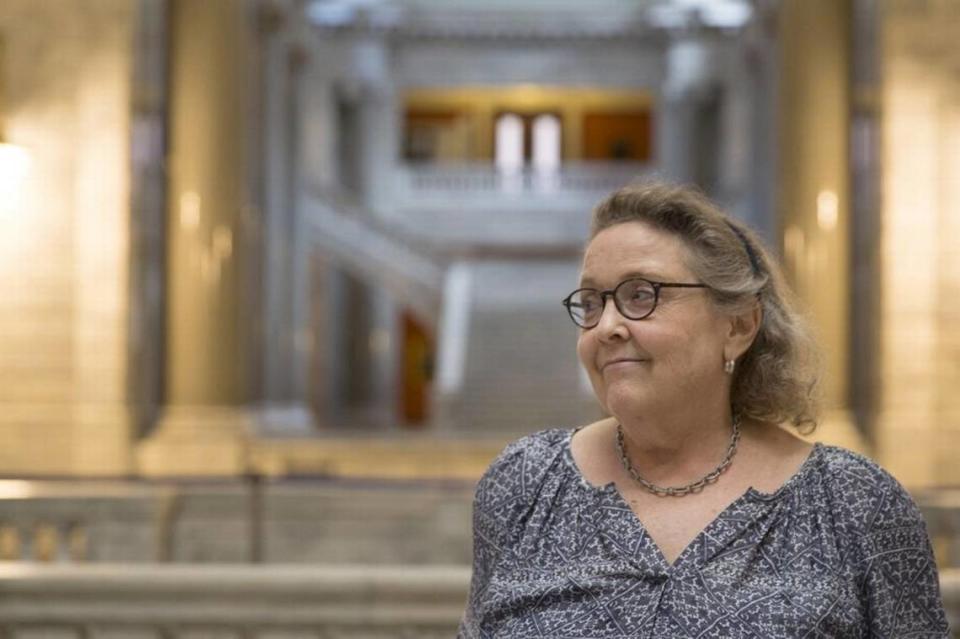UK swim coach sex abuse case shows how vital Kentucky open records law remains | Opinion
- Oops!Something went wrong.Please try again later.
The Lexington Herald-Leader recently shined an unexpected light on the critical body of Kentucky law that enables its reporters to shine a light on the Commonwealth’s public servants: the open records law.
In the article, reporter John Cheves delineates how his recent investigation into the University of Kentucky’s gross mishandling of allegations leveled against swimming and diving coach Lars Jorgensen — and the university’s subsequent wall of silence concerning Jorgensen’s and its own misdeeds — would have been impossible were it not for the Kentucky open records law.
Herald-Leader Editor Rick Green attributes the newspaper’s coverage of this enormously important story of the university to Cheves’ persistence and to public records obtained through the open records law.
The open records law is, as many Kentuckians know, under annual assault by state lawmakers. The law is regularly ignored — and even defied — by public agencies and agency heads taking their cues from feckless leaders who criticize, deride, and in some cases, actively fabricate lies about it.
Not surprisingly, it is the same open records law that exposes these elected leaders’ own improprieties and illegalities, and that secures the public’s right to know “inconvenient and embarrassing” truths like those UK sought to conceal from The Herald-Leader and Cheves — all the while giving pious lip service to the law’s value.
Cheves’ article focuses on the specific role the open records laws played in unraveling the shroud of secrecy woven by the university as it undertook to rid itself of Jorgensen and “pass the harasser” to a subsequent employer with no “black mark on his permanent record.”
The article should be reprinted on every editorial page in the Commonwealth. It should be required reading for every journalism student, reporter, editor, and media organization; for every disdainful public official (including state lawmakers) and public agency head; every aspiring public official and public agency head, and, indeed, for every Kentuckian.
Cheves writes: “Nobody at the University of Kentucky wanted to talk about swimming and diving head coach Lars Jorgensen in June 2023 when he suddenly exited the campus amid a swirl of unanswered questions and rumors.
“The open records law, enacted by state legislators in 1976, requires public agencies, such as UK, the state’s flagship public university, to share their documents upon request, with limited exceptions.
“So far, we’ve submitted a half-dozen records requests for Jorgensen’s personnel file, including performance evaluations; correspondence about him between university officials; complaints received about him; disciplinary actions taken against him; and communications with his attorneys, among other documents. The responses have included hundreds of pages, some dating back 12 years.
The Lexington Herald-Leader’s commitment to fight for the preservation of the open records law should be every Kentuckians’ commitment — not just when the laws are under direct legislative attack during the annual legislative session but year round. Kentuckians should demonstrate their support for open government laws in word and deed.
Unless it is to enhance the public’s right to know — by, for example, employing advancements in technology to mandate hybrid public meetings — we should demand that they cease pretending to “fix,” modernize, and/or clarify laws that are abundantly clear to all but these self-serving proponents of unneeded change.
It is these elected officials — lawmakers and office holders — who deeply resent the law and seek to undermine it by whatever means are within their grasp.
It is these elected officials who cultivate defiance of the words of the framers of the law, writing in its 1970s’ preamble:
“[T]he people of this Commonwealth do not yield their sovereignty to the agencies which serve them; the people, in delegating authority, do not give their public servants the right to decide what is good for them to know; the people insist on remaining informed so they may retain control over the instruments that they have created.”
It is this breed of public servant — legislator, governor, university administrator — who is unworthy of public office and the public’s trust.
To each we issue this challenge: please prove us wrong.

Amye Bensenhaver is a former assistant attorney general and co-founder of the Kentucky Open Government Coalition.

